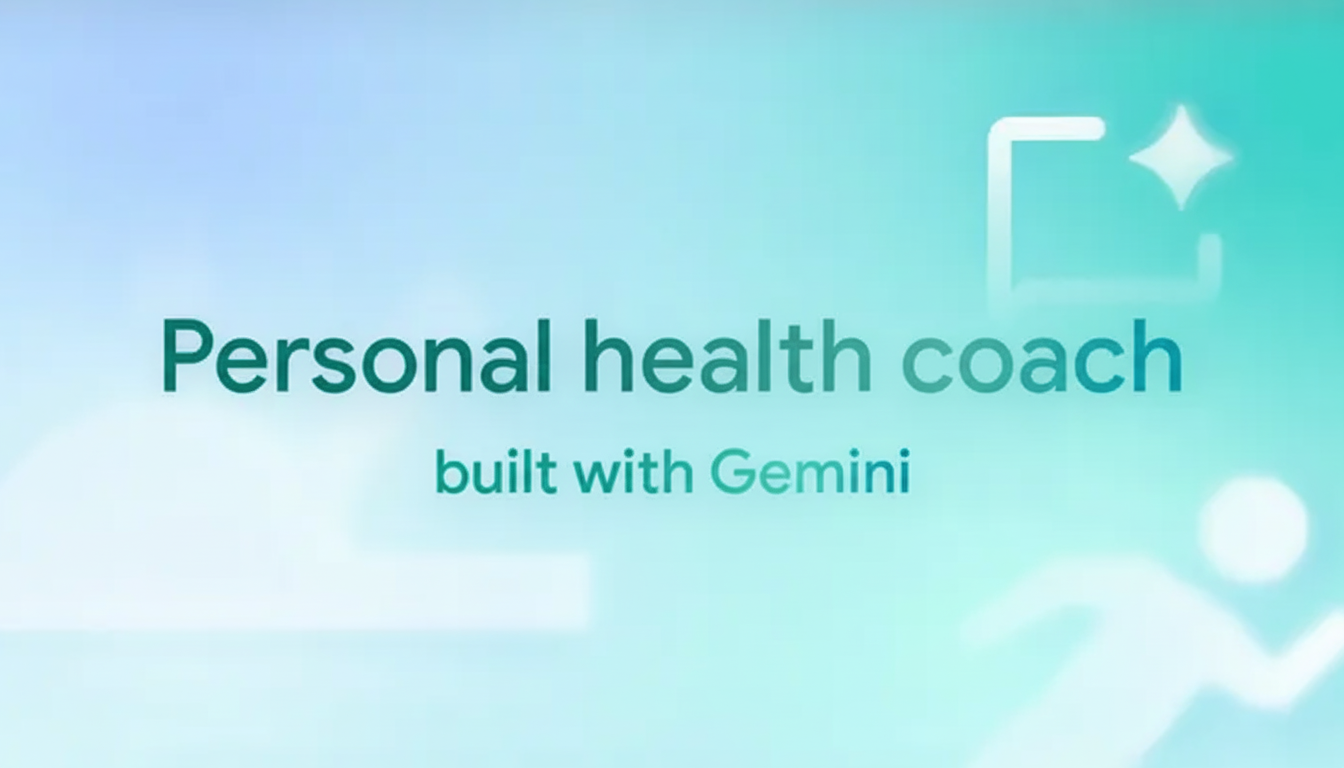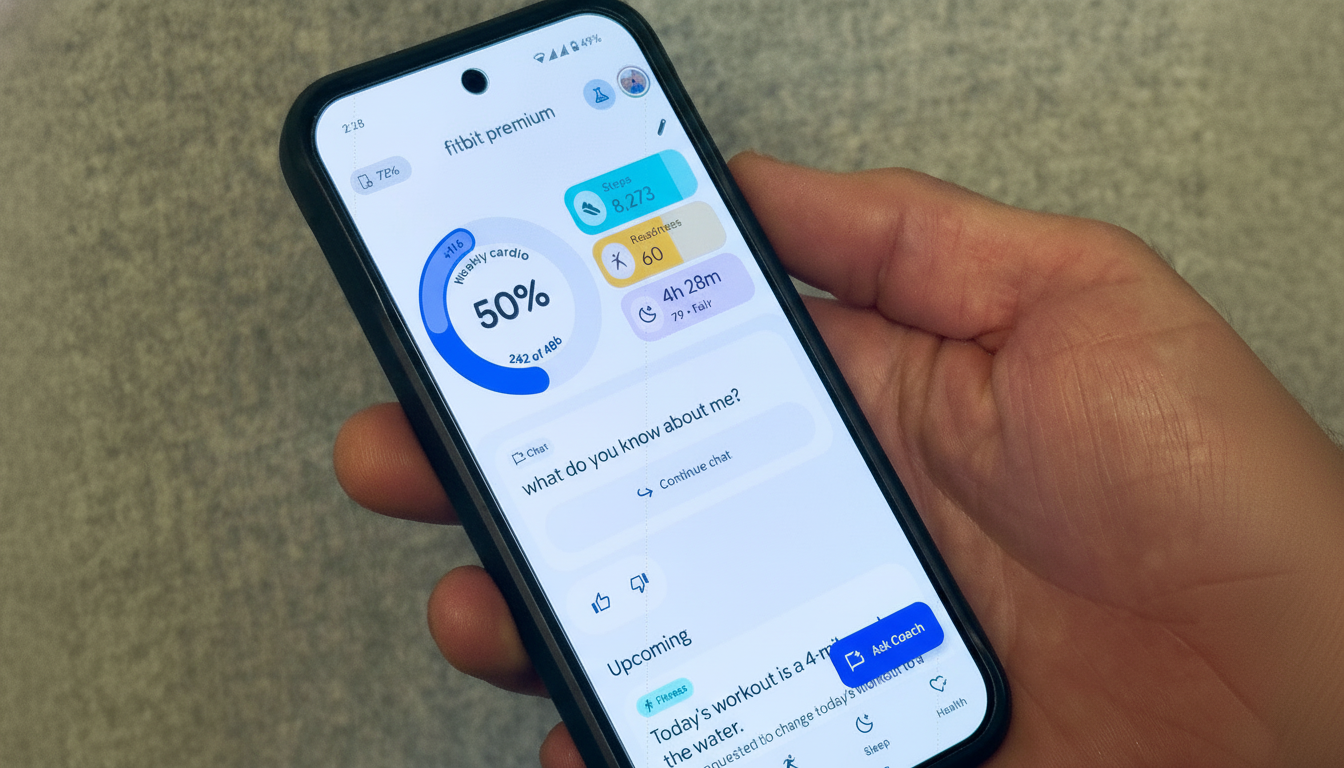Fitbit is also launching a new app today, which will now feature Coach — a Gemini-engineered health and fitness assistant that’s beginning to roll out in “early preview” for Premium members on Android in the U.S. Public availability on iOS will follow.
The revamp brings a less cluttered look and builds in more AI-inspired guides that adjust workouts, sleep strategies, and recovery plans on the fly based on your data and feedback.

What’s new in the Fitbit app: tabs, metrics, and a cleaner design
The updated app categorizes daily health into four tabs: Today, Fitness, Sleep, and Health, dispensing with the former hunt-and-tap routine in older builds.
- Today: your home screen — with glanceable cardio load, weekly trends, and favorite metrics you can rearrange to taste.
- Fitness: corrals training plans, personal records, and base stats — weekly average steps and cardio goals — as printed on the tin.
- Sleep: adds a more explicit nightly summary with Coach insights.
- Health: groups vitals such as breathing rate, SpO₂ (blood oxygen level), and resting heart rate into one place for at-a-glance wellness.
From a design perspective, the focus is on fewer, more meaningful tiles and faster access to the numbers people check most often. Fitbit’s strategy reflects a wider industry trend: remove clutter, surface trends, and turn raw data into something users can actually act on.
Inside Coach powered by Gemini: adaptive training and recovery
Coach takes advantage of Google’s Gemini assistant to act as an adaptive trainer and wellness adviser. Tell it that you want to run longer without gassing out, and it suggests a progressive plan with interval targets and rest advice. Midweek, tweak your goal or hit a new PR — or, two weeks in a row, let Coach know that you’re feeling sore and flagging, and Coach recalibrates the schedule, dialing intensity up or down based on your feedback and recent load.
In real terms, that could mean a lifter enjoys easier, light-volume work after a strong trend for HRV and lower resting heart rate, while one runner receives lighter accessory work when sleep efficiency drops. On the recovery end, Coach can point out irregular bedtimes or extended wake episodes and recommend specific actions — perhaps moving up caffeine cutoffs, adjusting wind-down routines — that might help to level things off. It is the kind of context-aware coaching that elite programs provide, now scaled through on-device data and conversational nudges.
The pitch is personalization with guardrails. Though smart enough to slow the pace of progression and flag red flags, AI isn’t a diagnostic aid in itself. Look for firm line-drawing around medical claims and a nudge to see clinicians if symptoms or persistent abnormalities emerge.
Early limitations, device support, and platform rollout
Fitbit Premium members with a compatible Fitbit device or Pixel Watch can try out the preview now on Android. A few of the most requested features, like native nutrition tracking and cycle logging, are still missing, as is deeper iOS integration. Such a phased rollout is common for health platforms that rely on OS-level permissions and data pipelines.

Premium pricing remains, making Coach an extra cost: it was historically $9.99 a month or $79.99 per year. That dovetails with a larger market trend toward AI as a feature of subscriptions rather than an add-on upsell.
Why That Matters For Health And Wearables
Wearables now ship at mass volume — the research firm IDC pegs global volumes north of 500 million units during the most recent year — and yet we are no closer to deciphering metrics into improved behavior. The next frontier is AI coaching. Whoop has a digital coach that interprets strain and recovery; Oura is testing out more personalized coaching responses, while Apple and Samsung keep expanding workout and sleep insights further inside their own ecosystems.
The stakes are competitive, to be sure. Globally, the World Health Organization says 31% of adults are not doing enough in terms of physical activity and, further, insufficient sleep continues to be associated with higher cardiometabolic risk according to the American Heart Association. If Coach can do that in a way that sustains itself and nudges behavior (say, two more active days a week or even 5% more sleep efficiency), the downstream health impact could be meaningful at population scale.
Privacy and data stewardship are definitely core. Historically, Fitbit’s model has kept user controls front and center, with permissioning down to the level of things like SpO₂ and heart rate variability and an option (on Android) to route some data through Health Connect. Look for ongoing transparency about where AI runs, what data trains it, and how recommendations are made.
What to watch next as Fitbit rolls out Coach preview
Key signals over the next several months:
- Stick to plans built using AI
- Quantifiable shifts in recovery markers
- Whether Coach’s guidance feels more targeted than generic
A move to iOS would challenge the idea of cross-platform parity, but deeper integrations — think strength form cues derived from a wearable signal or smarter cross-training as injury risk increases — could take it beyond — so helpful you won’t know how you lived without it.
Fitbit’s current update is the obvious swing at turning data into daily decisions. If the quality of the preview’s coaching scales as well across different fitness levels and goals, Premium might feel less like a paywall and more like a personal trainer beamed into your wrist.

